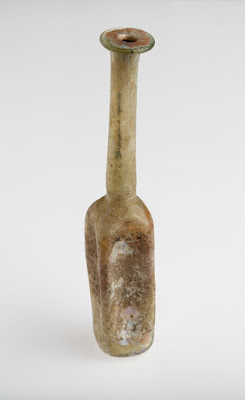The gerundive was
first referred to in the following two posts:
[1] https://adckl.blogspot.com/2024/08/260924-level-2-ora-maritima-24-and-25-6.html
[2] https://adckl.blogspot.com/2024/11/120225-level-2-reading-schoolmasters.html
[i] laudandus,
-a, -um: gerundive; it is adjectival i.e. it agrees with the noun
in gender, number and case
[ii] the literal
meaning is: to be Y-ed, for example:
mīles laudandus
│a soldier (who is) to be praised
epistula scrībenda│
a letter (which is) to be written
dēdit mihi epistulam
legendam tuam (Cicero) │he gave me your letter to read [ = (which
was) to be read]
deinde eum … redūcendum Faleriōs
puerīs trādidit (Livy) │ he then handed him to the boys to
be taken back to Falerii
Gravis iniūria
facta est et nōn ferenda. │ A grave and intolerable wrong has
been done, i.e. a wrong ¦ which is not to be tolerated
Gerundives exist
in English derivatives:
agenda:
things that are / need to be done (usually during a meeting)
memorandum
(pl. memoranda): a reminder, something that is to be remembered
addendum
(pl. addenda): something which is to be added, usually at the end
of a document
corrigendum
(pl. corrigenda): an error that is to be corrected in a book
after publication
2 English proper
nouns:
Amanda
(literally: she who is to be loved)
Miranda
(literaly: she is who to be wondered / marvelled at)
[iii] Because it
is referring to something that is to be done it can also refer to as a future
passive participle
[iv] It is formed
from the stem of the present tense with a distinctive -nd- ending + the
adjective endings -us, -a, -um; below are its forms with its basic meaning
laudō, laudā¦re
[1] > lauda- > lauda¦nd¦us, -a, -um │ which is to be
praised (future passive participle i.e. something that is to be done in the
future)
timeō, timē¦re [2]
> time- > timendus, -a, -um│ which is to be feared
dūcō, dūce¦re [3]
> dūc- > dūcendus, -a, -um│ which is to be led
3-iō and 4th
conjugation have -ie- before the ending is added
capiō, cape¦re
[3-iō] > capie¦nd¦us, -a, -um│ which is to be captured
audiō, audī¦re [4]
> audiendus, -a, -um│ which is to be heard
[v] The most
frequent use of the gerundive is with esse. In grammar this is known as
the passive periphrastic, a term that sound intimidating, but all it
means is that more than one word is required to express the idea. Unlike
English, the overwhelming majority of Latin verbs simply need a single word to
express the idea e.g. veniēbat (he was coming), laudāmur (we are
praised) whereas a periphrastic construction needs more than one.
The verb esse
can be in the present, imperfect or future tense:
Hoc faciendum est. │ This must be / has
to be / needs to be done.
Hoc faciendum erat. │ This had to be / needed
to be done.
Hoc faciendum erit. │ This will have to be done.
Depending on
context, the translations can be flexible depending on whether something ought
to be / should be done or needs to be / must be done:
Hic liber legendus
est. │ Literally: This book is to be / needs to be / should
be / worthy of being read =
this book is worth reading.
Carthāgō dēlenda
est. │ Carthage must / should be destroyed.
Mīles laudandus
erat. │ The soldier was to be praised = the soldier was praiseworthy.
[vi] If the action
that needs to be done includes who needs to do it i.e. the agent,
then the dative is used to express it. The gerundive conveys a sense of obligation
and it is given that grammatical term: the gerundive of obligation.
Carthāgō nōbīs dēlenda
est. │ Carthage is to be destroyed by us i.e. even though the
translation is ‘by us’ (which would suggest an ablative), it is the
dative that expresses the idea in this construction.
It would be
perfectly possible to rework the sentence from a passive to an active meaning:
Carthāgō nōbīs dēlenda
est. │ Carthage is to be destroyed by us > We must destroy Carthage.
English can convey
a similar idea:
Hic liber tibi
legendus est │literally: this book is to be read by you > this book is for you to read > you
need to read this book
[vii] In all the
examples above, there is a subject since the construction conveys [X: noun]
needs to be Y-ed
Hic liber legendus est. │ This book needs to
be read.
Carthāgō (nōbīs) dēlenda est. │ Carthage
must be destroyed (by us)
However, the
neuter singular of the gerundive + esse can express an impersonal idea
i.e. there is no noun subject to which something needs to be done.
Mihi currendum est │I need to
run; the gerundive here indicates the agent must perform that action.
Sometimes, no
agent is indicated i.e. there is simply a neuter gerundive with esse;
context will determine how that is best translated, for example:
Pugnandum est │
(I, you, we etc.) need to fight i.e. there is need for fighting; even though no
agent is indicated, it is usually best to include a subject.
In the next post
we will look at a further use of the gerundive, namely to express purpose i.e.
the third column in the first image.

























